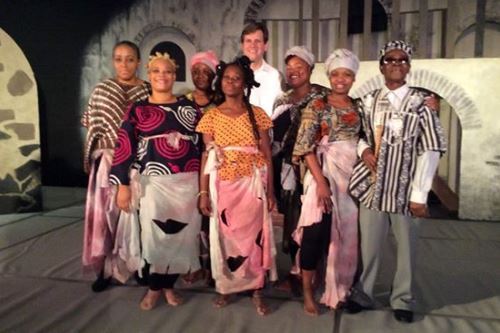Our ancestors’ voices fade more quickly than the legacies they leave us. Revisiting, resurrecting, and reviving those voices can be a joyous, painful, and transformative experience. In November the New Route Theater premiered School of Music Professor Ama Oforiwaa Aduonum’s new play, Walking with My Ancestors. The production reconstructed the lived experiences of African women who were enslaved at Elmina Castle on the coast of Ghana for several months at a time, before being loaded onto ships and transported to the Americas.
Aduonum received a grant from Illinois State University to travel to Ghana, and to visit Elmina Castle, where she began researching and writing the play. During her time abroad she wrote nightly letters to her students in which she shared her reflections on her experiences in the castle.
Her time at the castle was transformative. Aduonum believes the spirits of Elmina Castle’s slaves are not gone forever. They “ linger there,” as if to say … “Our stories and voices still reside within these walls. Please listen.” The play’s characters animate these forgotten voices. They tell stories of what enslaved Africans endured before the Middle Passage brutally transformed them from Africans into chattel. Her emphasis was primarily on African women’s struggle to survive for months without adequate food, water, clothing, space, hygiene or safety. One of the most profound experiences Aduonum described happened during a tour of the castle’s dungeon. As she sat in the damp and dark dungeons, she imagined what it must have been like to have been an African woman. Captured. Confined. Waiting, among other women for some unknown outcome, while sitting in your own filth. These women, she stressed, “went in as Africans and came out as slaves. Buried and reborn in those tombs and wombs.”
The creative process leading up to the production of Walking with My Ancestors taught Aduonum to cherish and honor her ancestors. She did so through dance, music, and celebration. Despite the precious historical lessons that have been lost, she still considered it, “an honor to be in that space.” She said, “I thought, I have nothing left here—no pictures, fingernails, letters, or hair, but I have these walls floors, and smell.”
The disruption of Africa’s history, culture, and society is part of what destroyed Africa, and Africa is still feeling this today. “We don’t know where we are going,” she said, “because we have so many gaps in our history and culture.” Aduonum is passionate about educating Illinois State students and her new play is one way she aims to fill the gap in the world’s awareness of Africa’s true colonial history. She integrates these lessons on African cultures and New World slavery into her courses on Black Music, World Music, and Women in Music.

